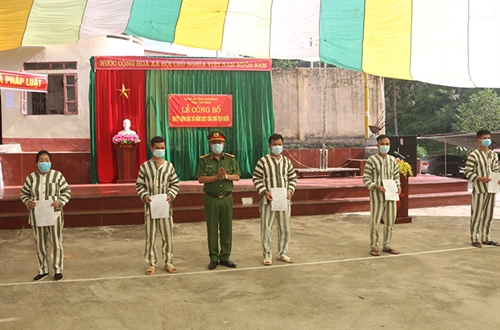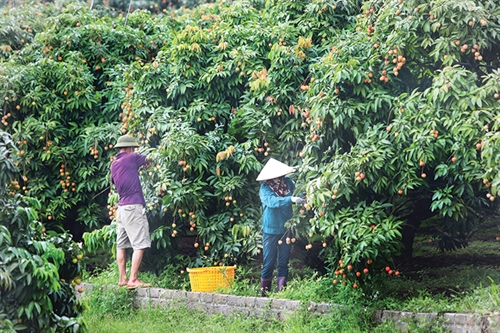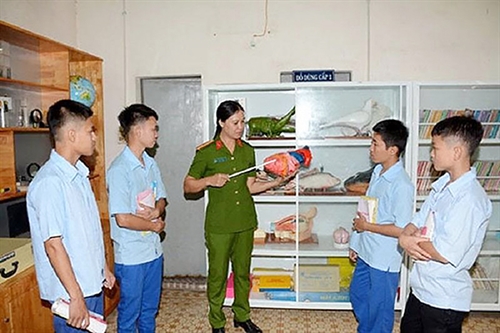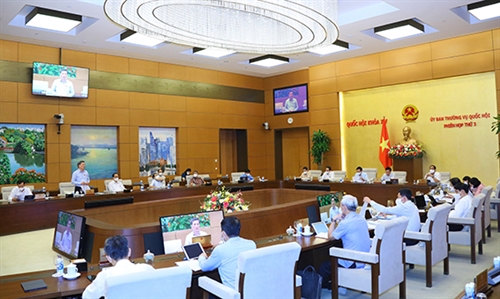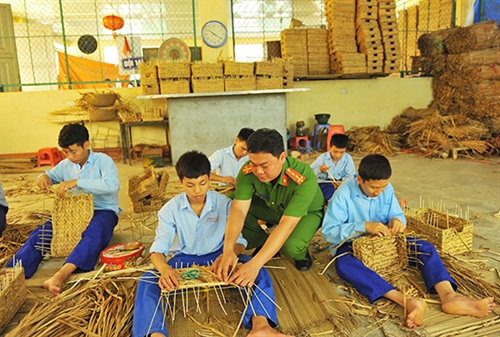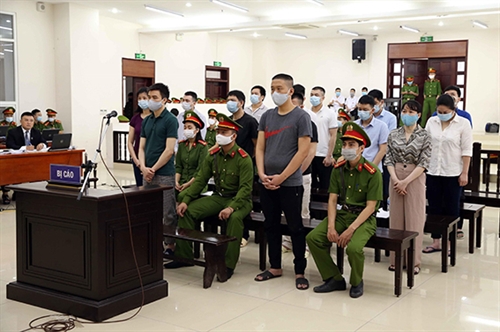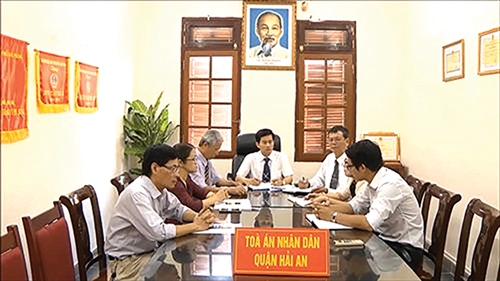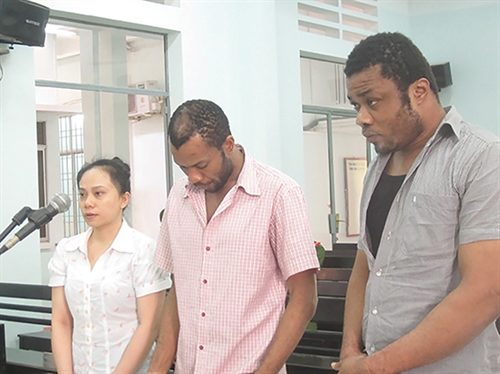Le Thi Diem Hang, LL.M.
Criminal Law Faculty
Hanoi Law University
In Vietnam, the protection of human rights, especially women’s rights, under the penal law, can be viewed from two aspects: (i) protection of human rights of crime victims when their rights are considerably infringed upon by crimes and (ii) guarantee of human rights of offenders who are subject to the State-imposed harshest coercive measures, i.e., penalties. Obviously, the penal law has provisions on harsh punishment of criminal acts infringing upon rights of women, but it also provides special leniency and commutation policies applicable to the handling and punishment of female offenders.
At present, the 2015 Penal Code (revised in 2017) (the Code), as the only source of Vietnam’s penal law, clearly expresses the State’s policies to protect women and translates into domestic laws international standards on the protection of women.
Protection of women who are crime victims
In a broad sense, crime victims are individuals, agencies, organizations or communities that suffer physical, spiritual and property damage and harms to other lawful rights and interests directly caused by criminal acts. This article touches upon crime victims in a narrower sense, e.g., persons who suffer criminal damage.
Crime victims are not considered the central subject of human rights in the criminal justice. They are passive beneficiaries of criminal justice since the penal law directly governs social relations arising between the State and offenders or commercial legal persons (corporate offenders) that are criminally charged upon the occurrence of criminal events. However, crime victims need attention and protection by the penal law, “for their primary damage caused by crimes and secondary damage likely to be caused by crimes or caused by the procedural environment and public response in case they are neglected or disrespectfully treated by criminal justice bodies in the course of justice access.”[2]
The Code has translated into domestic laws international standards on women and protection of their rights as subjects impacted by crimes. Apart from having universal human rights protected, women also have the following groups of rights guaranteed: the right to motherhood, right to gender equality, right to personal freedom and security and right to sexual freedom; and right to freedom of marriage. Accordingly, criminal acts against women may be treated as crime determination factors, penalty frame aggravating factors or criminal liability aggravating circumstances.
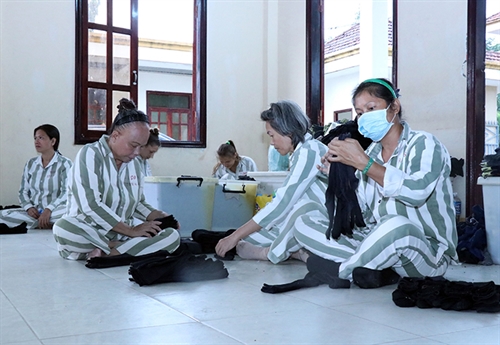 |
| Female inmates in Thu Duc detention camp, Binh Thuan province, are provided with vocational training and may opt for jobs suitable to their health__Photo: Xuan Khu/VNA |
Protection of women’s motherhood
One of women’s special human rights is the right to protection of motherhood. Article 10.2 of the International Covenant on Economic, Social and Cultural Rights expressly provides: “Special protection should be accorded to mothers during a reasonable period before and after childbirth.” Requirements for special measures to protect the motherhood are also set forth in many articles of the Convention on the Elimination of All Forms of Discrimination against Women (CEDAW).
Regarding the domestic penal law, the Code first of all criminalizes the act of illegal abortion in Article 316. Accordingly, any acts of performing abortion operations without permits granted by the Ministry of Health or provincial-level Departments of Health causing human death or causing harm to pregnant women’s health will be criminally examined.
In addition to criminalizing the act of illegal abortion, Article 52.1.i of the Code says “Committing a crime against a pregnant woman” is a general criminal liability-aggravating circumstance applicable to all crimes. Besides, committing a crime against a woman known as being pregnant is also a penalty frame aggravating circumstance of many crime constituents applicable to all crime groups prescribed in the Code. Compared to the 1999 Penal Code, the Code broadens the range of crimes for which committing a crime against a woman known as being pregnant can be regarded as a penalty frame aggravating circumstance and, at the same time, requires that the offender is fully aware of the victim’s pregnancy, for the purpose of uniformly applying this circumstance.
One novel provision of the Code regarding the protection of women’s right to motherhood is criminalizing the act of organizing surrogacy for commercial purpose in Article 187. Surrogacy for commercial purpose is an arrangement in which a woman agrees to carry and give birth to a child on behalf of another person by means of application of an assisted reproductive technology in order to get economic benefits or other benefits. A surrogacy organizer is a person who helps the intended parents and the surrogate perform the surrogacy through creating conditions for the parties to meet and make negotiations and arrangements or providing support for the performance of the surrogacy for the ultimate profit-making and self-seeking purposes. The act of organizing surrogacy for commercial purpose is an unlawful practice of making money from women’s bodies, showing disrespect for dignity of surrogate women and making them unwillingly perform motherhood. Therefore, the Code’s criminalization of this act is necessary to protect women from being exploited for their fertility.
Protection of women’s right to gender equality
Women’s right to gender equality can also be referred to as fair treatment between the two genders in certain fields. However, this does not necessarily means treating women and men in the same manner. Gender equality or gender fairness for women can therefore be understood as fair treatment of women based on their natural functions and gender characteristics.
Regarding the equality before law, the Code not only removes the provisions that are unfair and discriminatory against women but also prescribes a separate crime of infringing upon the right to gender equality[3]. Though broadening the scope of this crime as compared to the similar crime referred to in Article 130 of the 1999 Penal Code (infringing upon the equal rights of women) to cover also men as crime victims and more clearly specifying the crime motive “for a gender-related reason”, it can be easily recognized that subjects impacted by this crime are mainly women.
Protection of the right to personal freedom and security and the right to sexual freedom and safety
The right to personal freedom and security can be construed as a fundamental human right reflecting the state of human existence in which every individual is entitled to legal security for his/her inviolability of life, health, honor, dignity and body. In this sense, the right to personal freedom and security is a fundamental human right and, therefore, women are certainly fully entitled to this right. Also by this definition, the right to sexual freedom and safety constitutes part of the right to personal freedom and security. However, due to their gender characteristics, women are always or more often victimized by sexual crimes. That’s why this right is usually singled out for research of women’s rights.
Among acts infringing upon the right to personal freedom and security, acts of sexual violence or assaults are the most common criminal acts against women and girls. The Code specifies groups of sexual crimes in Articles 141 thru 147 and 327 thru 329. One common feature of these crime groups is that an actually committed act can constitute a crime, regardless of whether or not it has caused a consequence. This clearly expresses the Code’s viewpoint of best protecting victims of sexual crimes. It also recognizes the circumstance of “making the victim pregnant” as a penalty frame aggravating circumstance for a number of sexual crimes.
Particularly, for sexual assaults, the Supreme People’s Court adopted on October 1, 2019, Resolution 06/2019/NQ-HDTP guiding the application of a number of provisions of Articles 141 thru 147 of the Penal Code and trial of cases involving sexual assaults against under-18 persons. This was one of the first guiding texts of the Code issued by the Supreme People’s Court to settle numerous arguable issues related to these crime groups, especially in the context that there were no guiding texts for the 1985 and 1999 Penal Codes regarding these crime groups and the courts still had to apply the Supreme People’s Court’s Document 329-HS2 of 1967 on review on and guidelines for adjudication of the crime of rape and some other sexual crimes. In such guiding texts, the right to sexual inviolability, particularly of women and girls, has been explicitly expressed.
Regarding other rights to personal freedom and security, as analyzed above, the Code protects women like other individuals when prescribing acts harming life or health or infringing upon human freedom rights as crimes of murder (Article 123), forced suicide (Article 130), intentionally inflicting injury to, or causing harm to the health of, other persons (Article 134), persecuting other persons (Article 140), trading in or appropriating human tissues or organs (Article 154), illegally arresting, holding in custody or detaining persons (Article 157), etc.
The Code also clearly enumerates criminal acts infringing upon the rights to personal freedom and security mainly against women and children, such as human trafficking (Article 150) and trafficking in persons aged under 16 years (Article 151). Compared to the 1999 version, the Code adds many changes related to these acts by concretizing subjective factors in addition to the self-seeking purpose, and clearly shows the danger of the crime of human trafficking by adding the factor of purpose of the crime: “for the purpose of sexual exploitation or forced labor, taking a body organ of the victim, or for another inhuman purpose”. This addition is quite necessary to make the Code conformable with the United Nations Convention against Transnational Organized Crime and the Protocol to Prevent, Suppress and Punish Trafficking in Persons, Especially Women and Children, and aimed at protecting the main group of victims of these crimes who are women and children. Additionally, Resolution 02/2019/NQ-HDTP of January 11, 2019, of the Supreme People’s Court’s Judicial Council, guiding the application of the Penal Code’s Article 150 on human trafficking and Article 151 on trafficking in persons aged under 16 years, also serves as a basis for uniform application in reality.
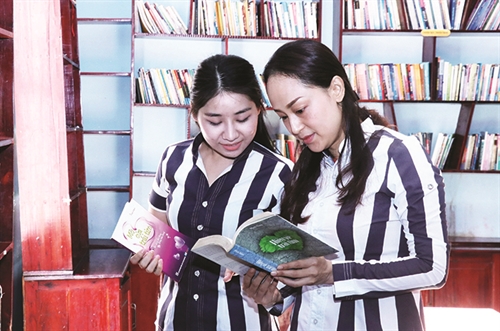 |
| Reading books, a daily activity of female inmates in Thu Duc detention camp__Photo: Xuan Khu/VNA |
| Reading books, a daily activity of female inmates in Thu Duc detention camp__Photo: Xuan Khu/VNA |
Protection of the right to freedom of marriage
The right to freedom of marriage is a right of people to get married (when satisfying the law-specified conditions) on their own will.
International law always emphasizes the aspect of gender equality in enjoying this fundamental human right for the reason that in reality women are usually deprived of this right due to backward traditions and customs and social prejudice. Specifically, the CEDAW’s Article 16 states: “State Parties shall take all appropriate measures to eliminate discrimination against women in all matters relating to marriage and family relations...”.
The Code has a whole chapter - Chapter XVII - on crimes against the marriage and family regime. Compared to the 1999 Penal Code, the Code amends and supplements a number of provisions on constituents of these crimes in order to make them more practical and feasible. Specifically, it adds the act of forcing other persons into marriage or divorce against their will or obstructing other persons from entering into voluntary and progressive marriage or from getting divorced. It also concretizes the aggravating circumstance of “causing serious consequences” (Article 182) into such consequences as “causing the divorce of either partner or both partners” or “causing the suicide of the spouse or a child of either partner” in order to adhere to the penal law’s principle of ramification of penal liability and principle of fairness.
Protection of female offenders
The international law with Conventions and Covenants on human rights in general and civil and political rights in particular, particularly the 1966 International Covenant on Civil and Political Rights, has laid down standards on human rights of criminally charged persons and persons whose freedom is deprived. Meanwhile, domestic laws of State Parties to these Conventions and Covenants have concretized and established legal mechanisms for exercise of these basic rights by criminally charged persons. From the viewpoint of the international law, offenders also belong to the group of vulnerable persons for the reason that the State, with its powers and legal institutions, may deprive or restrict their rights, thereby placing them in lower positions and making them become disadvantaged in social relations. Therefore, it is required to apply measures to protect offenders or, in other words, guarantee procedural justice (fairness in the processes) and contribute to ensuring substantive justice (fairness in final judgments of proceedings or procedural processes).
In fact, from among offenders, there are also persons belonging to the group of disadvantaged persons, including women. It can be said that female offenders suffer double disadvantage, because they themselves have lower social positions or face disadvantages in age, gender and health as compared to others, and concurrently are subject to law-enforcing actions of proceeding-conducting bodies and adverse impacts of public condemnation. That’s why the Code has special provisions aimed at protecting female offenders.
In the Part on General Provisions of the Code, one principle set out in Article 3 clearly states that all offenders are equal before law, regardless of their gender, ethnicity, belief, religion or social background and status. Accordingly, on principle, every offender is equally treated under the penal law and none is entitled to privileges and special treatment and subject to any discrimination for any reason and in any form. In other words, the Code guarantees social justice by affirming citizens’ equality in many fields, including gender equality.
However, in order to protect the motherhood, a special human right, of women, the Code has provisions on extenuation of penal liability, postponement of or total exclusion from the imposition of certain penalties against female offenders who are pregnant or nursing infants aged under 36 months. The physico-psychological changes during pregnancy have affected thoughts, behaviors and awareness of pregnant women about the danger of their criminal acts as well as possible consequences of such acts. The Code therefore provides the circumstance of “offender being a pregnant woman” as a circumstance extenuating the penal liability applicable to all crimes[4], which shows the humane attitude in the State’s criminal handling policies toward offenders who are pregnant women. This circumstance may be applied when there is evidence that a woman committing a crime is pregnant or based on a medical agency’s conclusion on her pregnancy at the time of crime commission.
Regarding the imposition of criminal penalties, women’s peculiar natural functions and social role make effects of these penalties on them different from those on men. So, the imposition of these penalties on female offenders requires special considerations of their personal identification and status. Gender characteristics may also influence reasons and conditions for women’s crime commission. Hence, there always exist special provisions on decision on and execution of penalties imposed on female offenders. The Code totally abolishes the death penalty against pregnant women and women nursing infants aged under 36 months[5]. It also provides non-execution of the death penalty against female convicts who are pregnant or nursing their children aged under 36 months[6], and non-application of community services to pregnant women or women nursing their children aged under 6 months in order to protect the health of mothers during the pregnancy or breastfeeding period.
To protect women’s motherhood, the Code also entitles female offenders who are pregnant or nursing children aged under 36 months to postponement of serving their imprisonment sentences until their children reach full 36 months old[7]. These women who are serving their imprisonment sentences are also entitled to suspension of serving such sentences[8]. When having served at least one-third of the imprisonment term or at least 12 years in case of life imprisonment sentences commuted to termed imprisonment, women currently nursing their children aged under 36 months may enjoy conditional early release[9].
In the Part on Crimes, the Code also protects women’s motherhood by prescribing the crime of killing or abandoning one’s newborn[10] which can only be committed by women who, under the strong influence of backward practices or in a special objective circumstance, kill or abandon their newborns within the first seven days, leading to the death of the children. In this case, lawmakers have analyzed and taken into account factors that negatively affect women’s psychology and cause them to commit the crime, including backward traditions or customs, financial capability to raise children or postnatal depression.-
[1] This article was made within the framework of the Hanoi Law University’s research subject titled “Protecting women with Vietnam’s criminal justice system”.[2] Le Lan Chi, Guaranteeing rights of crime victims and disadvantaged groups in criminal justice from provisions of law to operation of law practitioners, Political Theory Publishing House, Hanoi, 2019, p.26.[3] Article 165 of the Code.[4] Article 51.1.n of the Code.[5] Article 40.2 of the Code: “The death penalty shall not be imposed on persons aged under 18 years when committing a crime, pregnant women, women nursing children aged under 36 months, or persons aged full 75 years or older when committing a crime or being adjudicated.”[6] Article 40.3.a of the Code.[7] Article 67.1.b of the Code.[8] Article 68.1 of the Code.[9] Article 66.1.e of the Code.[10] Article 124 of the Code.
